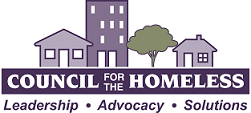By Charlene Welch, Council for the Homeless
Many people, myself included, have never experienced an extended period of poverty. I have never questioned where my next meal will come from or where I will sleep at night. Nor have I ever been on a budget so tight I could not afford for my basic needs and a little fun, too. A lack of income has not separated my family, forced me to drop out of school, or put me at the mercy of public transit when I have to be somewhere on-time or in a hurry. I have benefited from countless systemic structures in my life that helped me get a good education, job, healthcare, and home. I am invited to weigh in on the policies and practices that affect my family and greatly affect people I do not know. It is easy for me to vote, attend council or board meetings, and communicate with my elected officials. Knowing I have this privilege, I greatly valued the Poverty Immersion I took part in during the spring of 2018, hosted by our organization. It brought to light many of the unfair and demoralizing challenges people in poverty face every day, like those I mentioned above.
I encourage you to attend the Council for the Homeless Poverty Immersion on Saturday, April 25, 2020, 10am-1pm, at St. Joseph Catholic Church Marian Hall, 400 Andresen Road, Vancouver, WA 98661. Registration by April 16 is required at https://www.councilforthehomeless.org/poverty-immersion/
The poverty immersion is a facilitated and interactive workshop designed to increase empathy and challenge stereotypes of people with low incomes. A mock community is created during the event. Volunteers playing the roles of bankers, employers, law enforcement officials and DSHS staff, etc., interact with Attendees who are trying to meet their needs. An Attendee assumes the role of a family member living on limited income. Throughout the immersion, people are faced with the challenging daily dilemmas and stresses that are common when families have low-incomes. The activity is followed by a debrief session and an opportunity to make personal and/or professional action steps.
At the 2018 Poverty Immersion, David Lester of St. Joseph Catholic Church played the role of an employer. Carla Feltz of Vancouver Public Schools played the role of a woman, wife, and mother trying to navigate a series of stressful events that continually made her late for work. I witnessed Carla pleading for a second and even third chance to not lose her job. David the employer gave her one chance, but later fired her for being late. She was devastated. It was hard to watch. Even though we all had the luxury of play-acting and knew we would go home that day, the experience was powerful.
One does not need to attend a Poverty Immersion to have empathy for and insight into the lives of people who earn below the Federal Poverty Line, which is $22,600 per year for a family of four. Still, if poverty is not a lived experience, I encourage you to develop a deeper awareness; of walking a mile in some different shoes. It is eye opening and inspiring to participate.

